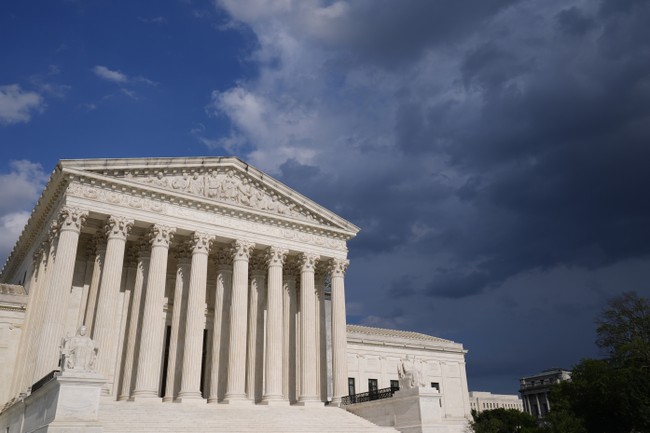The Supreme Court is already slated to consider almost a half-dozen cases involving prohibited persons in their October 10 conference, but the justices are apparently taking an interest in at least one more case; this one involving a Maryland man who was charged and convicted of possessing a firearm as a prohibited person after he was previously convicted for failing to pay child support.
Robert L. Fooks, represented by public defender Peter F. Rose, is asking the Court to take his case and decide whether “Maryland Code, Public Safety Article, § 5-133(b)(2), which provides that ‘a person may not possess a firearm if the person has been convicted of a violation classified as a common law crime and received a term of imprisonment of more than 2 years,’ violate the Second Amendment,” either facially or as it was applied to Fooks.
As Rose notes, his client was originally convicted on a charge of “constructive criminal contempt for failure to pay child support,” which is essentially an alternative way of prosecuting the misdemeanor crime of failure to pay child support. The common law crime isn’t considered a felony in Maryland, but a conviction on either charge would have precluded Fooks from possessing a firearm under current federal law, which bars legal gun possession for anyone convicted of a crime where the maximum possible sentence is more than one year in prison. Even if Fooks had been convicted on the misdemeanor charge, that carries a maximum prison term of three years, which would have also resulted in a lifetime loss of his Second Amendment rights.
Rose says that his client has no felony convictions to his name and “there is no evidence of dangerousness in his background,” which were also arguments Fooks raised during his trial for illegally possessing two handguns. The trial judge refused to consider Fooks’ Second Amendment claims, which led to Fooks accepting a conditional guilty plea that allowed him to continue making his Second and Fourteenth Amendment arguments on appeal.
Fooks was sentenced to five years in state prison, which was suspended to two years probation, but the felony conviction not only impacts his ability to keep and bear arms, but his ability to get and hold a job (among other things). By the time Fooks appeal reached the Maryland Supreme Court the U.S. Supreme Court had agreed to take up the Rahimi case, with the justices eventually declaring that “when an individual has been found by a court to pose a credible threat to the physical safety of another, that individual may be temporarily disarmed consistent with the Second Amendment.”
Though Fooks had never been found to pose a credible threat to the physical safety of himself or others, the Maryland Supreme Court found that the Maryland statute was “presumptively lawful” and the equivalent of the federal ban on felons possessing firearms, which Rose describes as “effectively designating Mr. Fooks as a ‘felon equivalent.'”
That Court went on to hold that examination of history supports the State’s broad authority to regulate possession away from entire categories of people generally “perceived to present a special danger” to society by virtue of a “willingness to break the law.” That Court further concluded that PS § 5-133(b)(2) is otherwise constitutional as applied to Mr. Fooks because the length of sentence he received indicates his offense was “egregious.” The majority largely ignored Mr. Fooks’s burden-shifting argument and the further import of Rahimi to the Second Amendment paradigm.
A dissenting opinion noted that under the majority’s argument “the General Assembly may make infractions such as jaywalking or exceeding the posted speed limit the basis for permanent firearms disqualification” by upping the penalty for those crimes. The dissent also pointed out that historically, “there was no founding-era regulation that addressed the societal problems PS § 5-133(b)(2) (as applied to Mr. Fooks) targets, i.e., disarming individuals based on prior nonviolent criminal convictions.”
In his cert petition to SCOTUS, Fooks’ attorney argues that the lack of consensus around the scope of prohibited persons statutes should compel the justices to adopt his case.
In response to the facial challenge to New York’s “proper cause” law in Bruen, this Court forbade the use of a “virtue test” in modern civil gun permitting regulations as impermissible burden-shifting under the Second Amendment that is not rooted in history and tradition. Rather, this Court held, it is the government’s burden to “justify its regulation by demonstrating that it is consistent with the Nation’s historical tradition of firearm regulation.” In applying the Bruen framework to Rahimi’s facial challenge to 18 U.S.C. § 922(g)(8), this Court confirmed the application of the Bruen analysis to criminal disarmament statutes that are predicated upon prior conduct. For it stands to reason that just as one need not demonstrate that one is deserving of a Second Amendment right that one already possesses (Bruen), one may not be dispossessed of that Second Amendment right unless and until the government can demonstrate that one is no longer deserving (Rahimi). However, Rahimi left unanswered the question of whether the governmen tbears some burden to show present dangerousness with respect to criminal statutes that base disarmament on a prior criminal conviction, which is simply another species of a virtue test for dangerousness based on prior conduct.
The larger question is whether the governing principle to be divined from examination of history and tradition is that considerations of dangerousness must inform the “central inquiry” into the operation of any modern criminal disarmament statute. As the majority in Rahimi said: “our Nation’s tradition of firearm regulation distinguishes citizens who have been found to pose a credible threat to the physical safety of others from those who have not.” And as Justice Barrett observed in her concurrence in Rahimi, the analogical reasoning under Bruen “demands a wide rlens: Historical regulations reveal a principle not a mold.”
Fooks may not be a candidate for Father of the Year, but that’s not really the issue here. The Supreme Court has said that someone can be temporarily disarmed under the Second Amendment if and when they’ve been found by a court to pose a credible threat to the physical safety of another. It stands to reason, then, that the courts would have to make a similar finding when permanently depriving someone of their Second Amendment rights.
The Maryland Supreme Court suggests that anyone sentenced to a term of three years or more, regardless of the nature of that offense, should be seen as “dangerous”, but I’m not convinced that even the state of Maryland views Fooks as dangerous. After all, it agreed to a plea deal that allowed Fooks to remain free on probation after he was charged with illegally possessing two firearms. If Fooks is so dangerous, why did prosecutors decide he didn’t need to spend any time behind bars?
I don’t know how much legal weight that particular argument carries, but it’s still worth considering from a common sense point of view.
A couple of weeks after Rose filed the cert petition on behalf of his client, the state of Maryland waived its right to respond. Now, though, the Supreme Court is requesting a response from the Maryland Attorney General’s office, which is due to the Court on October 29. The state can ask for a 30-day extension, and one will most likely be granted, but the justices could still decide to take this case before the New Year. I expect that by then SCOTUS will have already granted cert to one or more cases dealing with the federal prohibition on firearms ownership for “unlawful” users of drugs. A decision whether or not semi-automatic long guns can be prohibited may still be a term or two away, but we’re likely to learn more about who can be prohibited from keeping and bearing any arm at all before then.
Editor’s Note: Radical judges are doing everything they can to hamstring our right to keep and bear arms.
Help us hold these judges accountable for their unconstitutional rulings. Join Bearing Arms VIP and use promo code FIGHT to get 60% off your membership.
Read the full article here







![Florida Sheriff Runs a Free Ice Cream Truck with Seized Drug Money [WATCH] Florida Sheriff Runs a Free Ice Cream Truck with Seized Drug Money [WATCH]](https://www.rvmnews.com/wp-content/uploads/2026/02/2026.02.08-01.35-rvmnews-69889117279b8.jpg)


![Woke Rep. Crockett Claims GOP Voters Are Secretly Crushing on Her Senate Bid [WATCH] Woke Rep. Crockett Claims GOP Voters Are Secretly Crushing on Her Senate Bid [WATCH]](https://www.lifezette.com/wp-content/uploads/2025/03/2025.03.14-06.22-lifezette-67d473fe3eaca.jpg)
